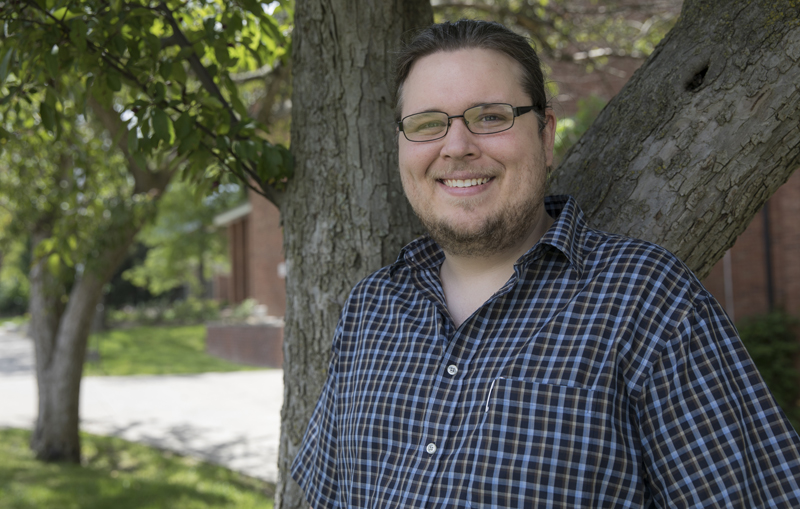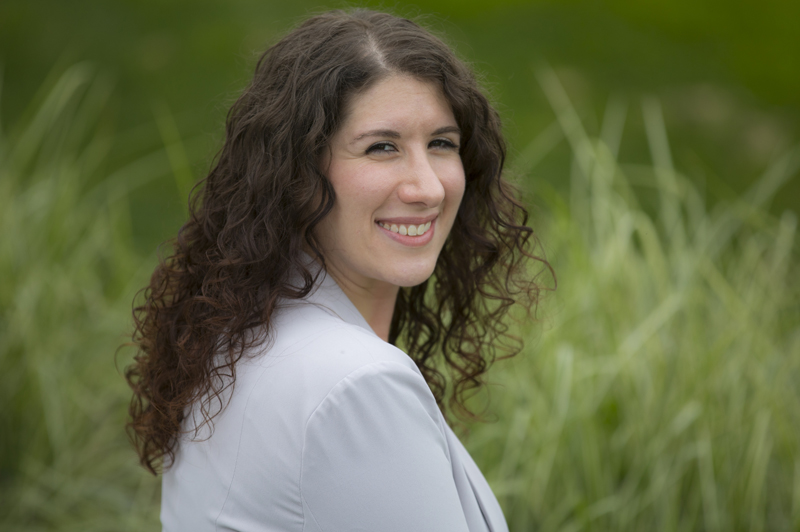Two doctoral students receive humanities fellowships
Pair will develop campus-community projects

Doctoral student Bradley Hutchison was on his way to Lebanon for a research trip when he learned that he had received a fellowship from Humanities New York.
“I was kissing my wife goodbye and headed for the JFK (airport) security line when I got the fellowship notice,” he said. “I’m a terrible flyer. I hate flying. So it was great to get this wonderful news to think about instead of worrying for nine hours about falling out of the sky in an airplane!”
Hutchison and fellow Binghamton University doctoral student Danielle Schwartz each received a year-long $8,000 Public Humanities Fellowship to implement a campus-community humanities-based project.
The fellowship “was developed to bring humanities scholarship into the public realm and strengthen the public humanities community in New York state by supporting emerging scholars,” according to Humanities New York, formerly known as the New York Council for the Humanities. Binghamton University – through its Institute for Advanced Studies in the Humanities — is in its first year as one of nine partner schools with the non-profit.
Hutchison, a 32-year-old from Memphis, Tenn., is a history student whose project is called “We’ve Always Been Here: Dialogues on History and Activism in Migrant Communities from the Middle East.” The project aims to bring campus, community and outside speakers together to discuss the legacy of migration between the United States and the Middle East and the evolution of the migrant experience.
The project application coincided with President Donald Trump’s failed Muslim travel ban.
“I thought (the project) certainly was going to grab people’s attention,” Hutchison said. “It’s time for academics to be public intellectuals and start to interface with the community on important issues. I’ve seen academics try to talk to a regular guy about immigration and they use terms like ‘acculturalization’ and ‘imperialism’ that don’t help them get their message across.”
Hutchison became fascinated with history after leaving Mississippi State University’s aerospace engineering program and then working as a tour guide in his hometown.
“I was telling people about the history of the city, so it seemed like a natural progression for me,” he said.
He even learned Arabic from a Lebanese immigrant who led him to the migrant communities of Memphis.
“People would give me stories,” Hutchison said. “They’d say: ‘We have this family history. My grandparents came here in the beginning of the 1900s.’ It was riveting to me that there was this story about Arab immigration that we did not know.”
Hutchison took his new-found knowledge and returned to school at the University of Memphis, where he received his bachelor’s in history in 2011 and his master’s in history in 2013.
At Memphis, Hutchison worked with a history faculty member who encouraged him to apply to Binghamton University’s doctoral program. The faculty member – Kent Schull – started at Binghamton in the fall of 2013.
The idea of working with Schull in the “most influential Ottoman history program in the country” was appealing, Hutchison said.
“It seemed like too much of an opportunity to let go,” he said. “Kent is the friendliest person. He’s always excited about your project. It’s great to have his support.”
Hutchison said he hopes to work with the Moise A. Khayrallah Center for Lebanese Diaspora Studies at North Carolina State University and the Arab-American National Museum in Dearborn, Mich., to find speakers. He would like the project to help community members better understand the plight of immigrants and refugees in Binghamton and other places.
“I hope people come away with a sense that migrants and refugees from the Middle East have always been here,” he said. “They have always contributed to society and they deserve a chance to stay.”
Schwartz, meanwhile, will use the power of film to unite campus and community members.
Her project, “Cineaste,” strives to create a public space for students, faculty members, local residents and cinema fans to screen and discuss film on a regular basis.
Watching movies with a large group of people helps build community connections, said Schwartz, who is studying English with a specialization in transnational cinema.
“You are sitting with members of your community and are all taking in the same experience and identifying with it differently,” she said. “(With this project), the community gets to know what we are doing at the University and the students get to know community members who could provide resources to give them a reason to stay after graduation.”
Schwartz said she has always been interested in movies. She recalled going to the cinema every Friday as an 18-year-old in West Bloomfield, Mich.
“I found that I love watching film in a group of people and I love turning around and looking at other people’s faces while watching a film,” the 28-year-old said. “That’s not a normal thing, but I was always interested in how people watch film and how it shapes them.”
Schwartz received her undergraduate degree in English with a specialization in film from Michigan State University in 2011. She then moved to Los Angeles and worked for three years as an assistant to a director and producer and as a production coordinator for Trailer Park, helping with the DVD extras for “The Hobbit: An Unexpected Journey.”
“I realized that my passion wasn’t working in film,” she said. “It’s watching film and thinking about film and engaging critically in film.”
Schwartz returned to Michigan State and received her master’s degree in English literature and film studies in 2016. She started her doctoral work at Binghamton University in the fall of 2016 and is now interested in films that are hard to categorize in production terms. For example, are films produced in a variety of countries considered “Hollywood movies?” Is a film such as “Slumdog Millionaire” a drama or comedy, Hollywood or Bollywood?
“I’m interested in how the current, global moment contributes to that confusion and how we can make a meaning of it,” she said.
Harpur Cinema, along with local libraries and the Bundy Museum of History and Art, could all serve as potential partners in the project, Schwartz said. The project would focus on mainstream movies, with perhaps a week devoted to works from cinema students.
Schwartz and Hutchison have from August 2017 to June 2018 to develop their projects. During that time, they will take part in speaking engagements and a New York City workshop with other Humanities New York fellows. The pair also will make presentations as fellows of the Institute for Advanced Studies in the Humanities. A final presentation on their project findings is required, with the potential for further funding.
“More and more, funding for the humanities is going to be dependent on the public, or public and private philanthropy,” Schwartz said. “I’m honored to help find a common ground between everyday people who may not think about the University and the people who eat, sleep and breathe Binghamton University.”

